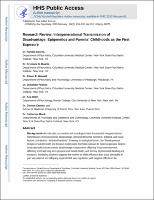Please use this identifier to cite or link to this item:
https://hdl.handle.net/20.500.12202/9637| Title: | Research Review: Intergenerational transmission of disadvantage: epigenetics and parents’ childhoods as the first exposure |
| Authors: | Scorza, Pamela Duarte, Cristiane S Hipwell, Alison E. Posner, Jonathan Ortin, Ana Canino, Glorisa Monk, Catherine 0000-0003-0825-6003 |
| Keywords: | biological models health status indicators infant development intergenerational relations parent-child relationships Psychological distress genetic markers socioeconomic factors parent attitudes prenatal exposure delayed effects epigenomics adversity development early life experience endocrinology epigenetics gene–environment interaction Stress |
| Issue Date: | 2019 |
| Publisher: | Wiley-Blackwell |
| Citation: | Scorza, P., Duarte, C. S., Hipwell, A. E., Posner, J., Ortin, A., Canino, G., & Monk, C. (2019). Research Review: Intergenerational transmission of disadvantage: epigenetics and parents’ childhoods as the first exposure. Journal of Child Psychology & Psychiatry, 60(2), 119–132. https://doi.org/10.1111/jcpp.12877 |
| Series/Report no.: | Journal of Child Psychology & Psychiatry;60(2) |
| Abstract: | Background: For decades, economists and sociologists have documented intergenerational transmission of socioeconomic disadvantage, demonstrating that economic, political, and social factors contribute to 'inherited hardship'. Drawing on biological factors, the developmental origins of adult health and disease model posits that fetal exposure to maternal prenatal distress associated with socioeconomic disadvantage compromises offspring's neurodevelopment, affecting short‐ and long‐term physical and mental health, and thereby psychosocial standing and resources. Increasing evidence suggests that mother‐to‐child influence occurs prenatally, in part via maternal and offspring atypical HPA axis regulation, with negative effects on the maturation of prefrontal and subcortical neural circuits in the offspring. However, even this in utero timeframe may be insufficient to understand biological aspects of the transmission of factors contributing to disadvantage across generations. Methods: We review animal studies and emerging human research indicating that parents' childhood experiences may transfer epigenetic marks that could impact the development of their offspring independently of and in interaction with their offspring's perinatal and early childhood direct exposures to stress stemming from socioeconomic disadvantage and adversity. Results: Animal models point to epigenetic mechanisms by which traits that could contribute to disadvantage may be transmitted across generations. However, epigenetic pathways of parental childhood experiences influencing child outcomes in the next generation are only beginning to be studied in humans. With a focus on translational research, we point to design features and methodological considerations for human cohort studies to be able to test the intergenerational transmission hypothesis, and we illustrate this with existing longitudinal studies. Conclusions: Epigenetic intergenerational transmission, if at play in human populations, could have policy implications in terms of reducing the continuation of disadvantage across generations. Further research is needed to address this gap in the understanding of the perpetuation of compromised lives across generations. [ABSTRACT FROM AUTHOR] Copyright of Journal of Child Psychology & Psychiatry is the property of Wiley-Blackwell and its content may not be copied or emailed to multiple sites or posted to a listserv without the copyright holder's express written permission. However, users may print, download, or email articles for individual use. This abstract may be abridged. No warranty is given about the accuracy of the copy. Users should refer to the original published version of the material for the full abstract. (Copyright applies to all Abstracts.) |
| Description: | Scholarly article / Open access |
| URI: | https://www.ncbi.nlm.nih.gov/pmc/articles/PMC6107434/ https://hdl.handle.net/20.500.12202/9637 |
| ISSN: | 0021-9630 |
| Appears in Collections: | Ferkauf Graduate School of Psychology: Faculty Publications |
Files in This Item:
| File | Description | Size | Format | |
|---|---|---|---|---|
| Ortin 2019 OA Research review intergenerational nihms937987.pdf | 237.81 kB | Adobe PDF |  View/Open |
This item is licensed under a Creative Commons License

